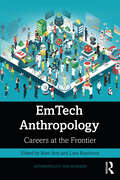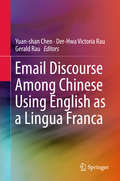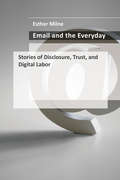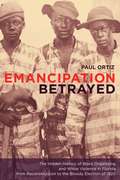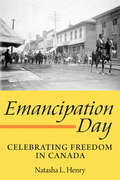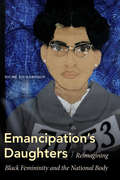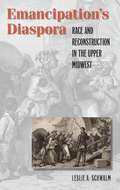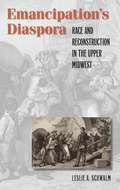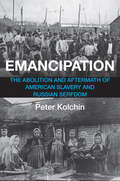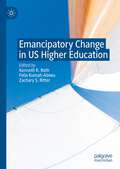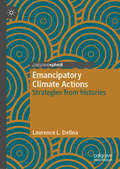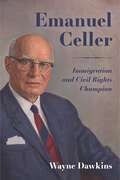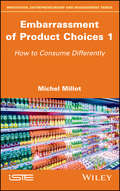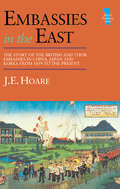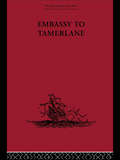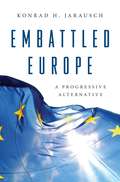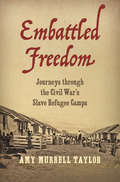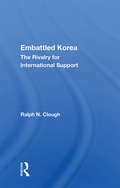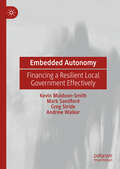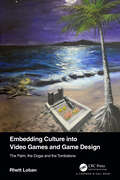- Table View
- List View
Elvis and Gladys (Southern Icons Series)
by Elaine DundyWho on the planet doesn't know that Elvis Presley gave electrifying performances and enthralled millions? Who doesn't know that he was the King of Rock 'n' Roll? But who knows that the King himself lived in the thrall of one dominant person? This was Gladys Smith Presley, his protective, indulgent, beloved mother. Elvis and Gladys, one of the best researched and most acclaimed books on Elvis's early life, reconstructs the extraordinary role Gladys played in her son's formative years. Uncovering facts not seen by other biographers, Elvis and Gladys reconstructs for the first time the history of the mother and son's devoted relationship and reveals new information about Elvis—his Cherokee ancestry, his boyhood obsession with comic books, and his early compulsion to rescue his family from poverty. Coming to life in the compelling narrative is the poignant story of a unique boy and the maternal tie that bound him. It is at once an intimate psychological portrait of a tragic relationship and a mesmerizing tale of the early years of an international idol. “For once, a legend is presented to us by the mind and heart of a literate, careful biographer who cares,” wrote Liz Smith in the New York Daily News when Elvis and Gladys was originally published in 1985. This is the book, Smith says, “for any Elvis lover who wants to know more about what made Presley the man he was and the mama's boy he became.” The Boston Globe called this thoughtful, informative biography of one of popular music's most enduring stars “nothing less than the best Elvis book yet.”
EmTech Anthropology: Careers at the Frontier (Anthropology & Business)
by Matt ArtzEmTech Anthropology: Careers at the Frontier emphasizes anthropology’s critical role at the frontier of emerging technologies (EmTech). The book explores the opportunities and challenges that arise as anthropologists venture into the territory of EmTech, pushing the boundaries of traditional academic approaches and methodologies.By sharing the stories and insights of early to mid-career anthropologists working in AI, robotics, Web3, cybersecurity, and other cutting-edge fields, the book provides a possible roadmap for future practitioners seeking to make an impact in the world of EmTech. These anthropologists demonstrate how the discipline's unique perspective and skills can be applied to address the complex ethical, social, and cultural implications of emerging technologies.The volume showcases how anthropologists can act as visionaries, innovators, and early adopters, shaping the trajectory of EmTech towards more ethical, equitable, inclusive, and sustainable futures. It highlights the importance of interdisciplinary collaboration, practical impact, and intervention in EmTech contexts while also acknowledging the need for anthropologists to challenge existing narratives and push the boundaries of the discipline itself.EmTech Anthropology: Stories from the Frontier serves as an essential resource for anthropologists, students, and professionals from related disciplines who are interested in exploring the frontiers of anthropology and emerging technologies. By offering a glimpse into the exciting possibilities and compelling insights that emerge when anthropology meets EmTech, the book inspires and guides the next generation of anthropological innovators.
Email Discourse Among Chinese Using English as a Lingua Franca
by Yuan-Shan Chen Der-Hwa Victoria Rau Gerald RauThis edited volume makes a valuable contribution to the burgeoning research field of English as a lingua franca. In a pioneering step, the collection is exclusively devoted to the English email discourse of Chinese speakers. The studies address innovative topics related to various contexts and relationships, using several different approaches and theories, which taken together shed light on how English serves as a lingua franca in multiple types of global written communication. The research topics presented are organized into four thematic sections, including emails from students to professors, emails from students to the international academic community, emails from peer to peer, and emails at the workplace. This collection of empirical research invites readers to consider the special features of apologies, requests, terms of address, politeness, and discourse organization, and how cultural differences may affect the use or interpretation of each. Throughout the book, readers will also discover how Chinese speakers use special features and strategies to construct their identity, establish relationships, and achieve successful communication in English. This highly informative, thought-provoking book also provides insights on methods for teaching email discourse using English as a lingua franca and suggests directions for future research.
Email and the Everyday: Stories of Disclosure, Trust, and Digital Labor
by Esther MilneAn exploration of how email is experienced, understood, and materially structured as a practice spanning our everyday domestic and work lives.Despite its many obituaries, email is not dead. As a global mode of business and personal communication, email outstrips newer technologies of online interaction; it is deeply embedded in our everyday lives. And yet--perhaps because the ubiquity of email has obscured its study--this is the first scholarly book devoted to email as a key historical, social, and commercial site of digital communication in our everyday lives. In Email and the Everyday, Esther Milne examines how email is experienced, understood, and materially structured as a practice spanning the domestic and institutional spaces of daily life.
Email from Ngeti
by Ngeti Mwadime James H. SmithEmail from Ngeti is a captivating story of sorcery, redemption, and transnational friendship in the globalized twenty-first century. When the anthropologist James Smith returns to Kenya to begin fieldwork for a new research project, he meets Ngeti Mwadime, a young man from the Taita Hills who is as interested in the United States as Smith is in Taita. Ngeti possesses a savvy sense of humor and an unusual command of the English language, which he teaches himself by watching American movies and memorizing the Oxford English Dictionary. Smith and Mwadime soon develop a friendship that comes to span years and continents, impacting both men in profound and unexpected ways. For Smith, Ngeti can be understood as an exemplar of a young generation of Africans navigating the multiplicity of contemporary African life--a process that is augmented by globalized culture and the Internet. Keenly aware of the world outside Taita and Kenya, Ngeti dreams big, with endless plans for striking it rich. As he struggles to free himself from what he imagines to be the hold of the past, he embarks on an odyssey that takes him to local diviners, witch-finders, Pentecostal preachers, and prophets. This is the fascinating ethnography of Mwadime and Smith, largely told through their shared emails, journals, and recorded conversations in the field. Throughout, the reader is struck by the immediacy and poignancy of coauthor Ngeti's narrative, which marks a groundbreaking shift in the nature of anthropological fieldwork and writing.
Emancipation Betrayed: The Hidden History of Black Organizing and White Violence in Florida from Reconstruction to the Bloody Election of 1920 (American Crossroads #16)
by Paul OrtizIn this penetrating examination of African American politics and culture, Paul Ortiz throws a powerful light on the struggle of black Floridians to create the first statewide civil rights movement against Jim Crow. Concentrating on the period between the end of slavery and the election of 1920, Emancipation Betrayed vividly demonstrates that the decades leading up to the historic voter registration drive of 1919-20 were marked by intense battles during which African Americans struck for higher wages, took up arms to prevent lynching, forged independent political alliances, boycotted segregated streetcars, and created a democratic historical memory of the Civil War and Reconstruction. Contrary to previous claims that African Americans made few strides toward building an effective civil rights movement during this period, Ortiz documents how black Floridians formed mutual aid organizations—secret societies, women's clubs, labor unions, and churches—to bolster dignity and survival in the harsh climate of Florida, which had the highest lynching rate of any state in the union. African Americans called on these institutions to build a statewide movement to regain the right to vote after World War I. African American women played a decisive role in the campaign as they mobilized in the months leading up to the passage of the Nineteenth Amendment. The 1920 contest culminated in the bloodiest Election Day in modern American history, when white supremacists and the Ku Klux Klan violently, and with state sanction, prevented African Americans from voting. Ortiz's eloquent interpretation of the many ways that black Floridians fought to expand the meaning of freedom beyond formal equality and his broader consideration of how people resist oppression and create new social movements illuminate a strategic era of United States history and reveal how the legacy of legal segregation continues to play itself out to this day.
Emancipation Day: Celebrating Freedom in Canada
by Natasha L. HenryWhen the passage of the Abolition of Slavery Act, effective August 1, 1834, ushered in the end of slavery throughout the British Empire, people of the African descent celebrated their newfound freedom. Now African-American fugitive slaves, free black immigrants, and the few remaining enslaved Africans could live unfettered live in Canada – a reality worthy of celebration. This new, well-researched book provides insight into the creation, development, and evolution of a distinct African-Canadian tradition through descriptive historical accounts and appealing images. The social, cultural, political, and educational practices of Emanipation Day festivities across Canada are explored, with emphasis on Ontario, Nova Scotia, New Brunswick, Quebec, and British Columbia. "Emancipation is not only a word in the dictionary, but an action to liberate one’s destiny. This outstanding book is superb in the interpretation of "the power of freedom" in one’s heart and mind – moving from 1834 to present." – Dr. Henry Bishop, Black Cultural Centre, Dartmouth, Nova Scotia
Emancipation and Illusion: Rationality and Gender in Habermas's Theory of Modernity
by Marie FlemingIn this comprehensive analysis of Jürgen Habermas's philosophy and social theory, Marie Fleming takes strong issue with Habermas over his understanding of rationality and the lifeworld, emancipation, history, and gender. Throughout the book she focuses attention on the various ways in which an idea of emancipation motivates and shapes his universalist theory and how it persists over several major changes in methodology. Her critique of Habermas begins from the view that universalism has to include a vision of gender equality, and she asks why Habermas, despite deeply held concerns about equality and inclusiveness, repeatedly and systematically relegates matters of gender to secondary status in his social and moral theory. She extends her critique to a range of issues in his theory of rationality and examines what she views as his very problematical claims about truthfulness, art, and bourgeois intimacy.The point of Fleming's critique of Habermas is not to dispute universalism, but to build on the key universalist principles of inclusiveness and equality. She is not persuaded by the view, shared by both sympathizers of Habermas and his postmodern critics, that to be for or against Habermas is to be for or against universalism. Her intention rather is to show that Habermas's theory of modernity is so structured that it cannot achieve its universalist aims. Contending that his theory is not universalist enough, she claims that universalism has to be reconceived as a radical, critical, and historical project.
Emancipation's Daughters: Reimagining Black Femininity and the National Body
by Riché RichardsonIn Emancipation's Daughters, Riché Richardson examines iconic black women leaders who have contested racial stereotypes and constructed new national narratives of black womanhood in the United States. Drawing on literary texts and cultural representations, Richardson shows how five emblematic black women—Mary McLeod Bethune, Rosa Parks, Condoleezza Rice, Michelle Obama, and Beyoncé—have challenged white-centered definitions of American identity. By using the rhetoric of motherhood and focusing on families and children, these leaders have defied racist images of black women, such as the mammy or the welfare queen, and rewritten scripts of femininity designed to exclude black women from civic participation. Richardson shows that these women's status as national icons was central to reconstructing black womanhood in ways that moved beyond dominant stereotypes. However, these formulations are often premised on heteronormativity and exclude black queer and trans women. Throughout Emancipation's Daughters, Richardson reveals new possibilities for inclusive models of blackness, national femininity, and democracy.
Emancipation's Diaspora
by Leslie A. SchwalmMost studies of emancipation's consequences have focused on the South. Moving the discussion to the North, Leslie Schwalm enriches our understanding of the national impact of the transition from slavery to freedom. Emancipation's Diaspora follows the lives and experiences of thousands of men and women who liberated themselves from slavery, made their way to overwhelmingly white communities in Iowa, Minnesota, and Wisconsin, and worked to live in dignity as free women and men and as citizens.Schwalm explores the hotly contested politics of black enfranchisement as well as collisions over segregation, civil rights, and the more informal politics of race--including how slavery and emancipation would be remembered and commemorated. She examines how gender shaped the politics of race, and how gender relations were contested and negotiated within the black community. Based on extensive archival research, Emancipation's Diaspora shows how in churches and schools, in voting booths and Masonic temples, in bustling cities and rural crossroads, black and white Midwesterners--women and men--shaped the local and national consequences of emancipation.
Emancipation's Diaspora: Race and Reconstruction in the Upper Midwest
by Leslie A. SchwalmMost studies of emancipation's consequences have focused on the South. Moving the discussion to the North, Schwalm enriches our understanding of the national impact of the transition from slavery to freedom. Emancipation's Diaspora follows the lives and experiences of thousands of men and women who liberated themselves from slavery, made their way to overwhelmingly white communities in Iowa, Minnesota, and Wisconsin, and worked to live in dignity as free women and men and as citizens. Schwalm explores the hotly contested politics of black enfranchisement as well as collisions over segregation, civil rights, and the more informal politics of race-- including how slavery and emancipation would be remembered and commemorated. She examines how gender shaped the politics of race, and how gender relations were contested and negotiated within the black community. Based on extensive archival research,Emancipation's Diaspora shows how in churches and schools, in voting booths and Masonic temples, in bustling cities and rural crossroads, black and white Midwesterners-- women and men-- shaped the local and national consequences of emancipation.
Emancipation: The Abolition and Aftermath of American Slavery and Russian Serfdom
by Peter KolchinIn this sequel to his landmark study, historian Peter Kolchin compares the transition to freedom after American emancipation with the Russian Great Reforms The two largest transitions from unfree to free labor of the many that occurred in Europe and the Americas during the nineteenth century took place in the United States and in Russia. Both occurred in the 1860s, and in both the former slaves and serfs strove to maximize their autonomy and freedom while the former masters worked to preserve as many of their prerogatives as possible. Both were partially—but only partially—successful. In this magisterial and long-awaited work, historian Peter Kolchin shows that a more radical break with the past was possible in the United States than in Russia, with the Southern freedpeople coming to enjoy republican citizenship, whereas Russian peasants remained subjects rather than citizens. Both countries saw conservative reactions triumph in the late nineteenth century. While this conservatism was common in most emancipations, it was especially strong in Russia and the American South, in part as a reaction against the major efforts to restructure the social order that went by the name of Reconstruction in the United States and the Great Reforms in Russia.
Emancipatory Change in US Higher Education
by Zachary S. Ritter Kenneth R. Roth Felix Kumah-AbiwuThis edited volume explores and deconstructs the possibilities of higher education beyond its initial purpose. The book contextualizes and argues for a more robust interrogation of persistent patterns of campus inequality driven by rapid demographic change, reduced public spending in higher education, and an increasingly polarized political landscape. It offers contemporary views and critiques ideas and practices such as micro-aggressions, implicit and explicit bias, and their consequences in reifying racial and gender-based inequalities on members of nondominant groups. The book also highlights coping mechanisms and resistance strategies that have enabled members of nondominant groups to contest primarily racial- and gender- based inequity. In doing so, it identifies new ways higher education can do what it professes to do better, in all ways, from providing real benefit to students and communities, while also setting a bar for society to more effectively realize its stated purpose and creed.
Emancipatory Climate Actions: Strategies from histories
by Laurence L. DelinaThis book calls for a collective strengthening of the progressive dimension of climate action in the face of continued myopic governmental response. Delina argues that consent must be revoked and power realigned to avoid suffering the consequences of unabated climate change. He looks back at the mechanisms that make previous social mobilizations successful to design strategies that would advance a new hegemonic agenda. This new agenda calls for the culturing of contemporary human societies towards a hegemony characterized by just emancipations and sustainable transformations. Mining select histories from India, the United States, the Philippines, and Burma, the book explores topics including visioning and identity building; framing; triggering pressure; boosting publicity; and diversifying networks as strategic tools to the repertoires of climate action groups, organizations, and institutions. It will be of great value to academics and practitioners, as well as to anyone interested in how to actively combat climate change.
Emanuel Celler: Immigration and Civil Rights Champion
by Wayne DawkinsCongressman Emanuel Celler (1888–1981) was a New York City congressman who served in the United States House of Representatives from 1923 to 1973. Celler’s almost fifty-year career was highlighted by his long fight to eliminate national origin quotas as a basis for immigration restrictions and his battles for civil rights legislation. In Emanuel Celler: Immigration and Civil Rights Champion, author Wayne Dawkins introduces new readers to a figure integral to our contemporary political system. Celler’s own immigrant background framed his lifelong opposition to immigration restrictions and his corresponding support for reducing barriers for immigrant entry into the United States. After decades of struggle, he proposed and steered through the House the Hart-Celler Act of 1965, which eliminated national origins as a consideration for immigration, profoundly shaping modern America. Celler was also a consistent advocate for civil rights. As chairman of the House Judiciary Committee from 1949 to 1973 (except for a break from 1953 to 1955), Celler was involved in drafting and passing the Civil Rights Act of 1964, the Voting Rights Act of 1965, and the Civil Rights Act of 1968. During his career he was also deeply involved in landmark antitrust legislation, the establishment of US ties with the state of Israel, and the Gun Control Act of 1968, and was the author of three constitutional amendments, including the 25th that established presidential succession. Dawkins profiles a complex politician who shaped the central tenets of Democratic Party liberalism for much of the twentieth century and whose work remains central to the nation, and our political debates, today.From author Wayne Dawkins:Emanuel Celler (1888–1981) could be the most significant US legislator of the twentieth century. He cosponsored three Constitutional amendments—the twenty-third (voting rights for District of Columbia residents), the twenty-fourth (poll taxes banned), and the twenty-fifth (clear succession established if the president is removed from office). And, as a longtime chairman of the House Judiciary Committee, he reluctantly cosponsored a fourth—the twenty-sixth amendment (18-year-old voting rights).He is also linked to three-hundred laws, notably the Civil Rights Acts of 1957, 1960, 1964 and 1968; the Voting Rights Act of 1965; and his masterpiece, the Hart-Celler Immigration Reform Act of 1965.Over the past decade, Celler, who served fifty years in Congress, has been a supporting cast member in at least a dozen books about immigration or civil rights. He was frequently cited in One Mighty and Irresistible Tide (2020) and noted in two key moments of The Guarded Gate (2019). And he was cited generously in Goliath (2019), a book about Celler’s other passion—antitrust and monopoly busting.But this fall, he will at last be the focus of a full-length biography, Emanuel Celler: Immigration and Civil Rights Champion. And I believe it will become the go-to book for anyone wanting to know more about this history-making legislator.
Emanzipation und Gewalt: Feministische Rechtskritik mit Karl Marx, Jacques Derrida und Gilles Deleuze (Philosophie & Kritik. Neue Beiträge zur politischen Philosophie und Kritischen Theorie)
by Liza MattutatSoziale Bewegungen stehen seit jeher in einem ambivalenten Verhältnis zum Recht. Einerseits versuchen sie oft, ihre Ansprüche als Rechte geltend zu machen, andererseits kritisieren sie die entpolitisierenden, gewaltsamen und repressiven Aspekte des Rechts. Liza Mattutat fragt deshalb, ob Rechtspolitiken möglich sind, die nicht nur die Inhalte des Rechts, sondern zugleich seine Form verändern. Dazu rekonstruiert sie die rechtskritischen Argumente von Karl Marx, Jacques Derrida und Gilles Deleuze und deutet mit ihnen zeitgenössische Auseinandersetzungen um die Ehe für alle, die Reform des Sexualstrafrechts und die Elternschaft von trans* Personen. Wo sind philosophische Rechtskritiken für die feministische Rechtspolitik einschlägig? Wo steht das bürgerliche Recht emanzipatorischen Bewegungen entgegen?
Emanzipatorische Subjektivität in der Psychologie: Von der Handlungsfähigkeit in gesellschaftlichen Widersprüchen
by Monique LathanDas vorliegende Buch untersucht Konzepte emanzipatorischer Psychologie. Diese zeichnen sich dadurch aus, dass sie die Erkenntnis des Menschen über sich selbst bzw. wissenschaftliche Einsichten in die menschliche Subjektivität als den Weg und das Mittel erweiterter individueller und gesellschaftlicher Autonomie betrachten. Das Ziel der Untersuchung ist es, durch eine kritisch reflektierte Analyse und eine anschließende vergleichende Darstellung der unterschiedlichen, oft einander sogar widersprechenden, psychologischen Ansätze dem allgemeinen Anliegen psychologischer Emanzipation, den Gemeinsamkeiten und Unterschieden ihrer jeweiligen Schule sowie dem Stand der dabei gewonnenen Erkenntnisse auf die Spur zu kommen. Die Autorin Monique Lathan ist derzeit als wissenschaftliche Mitarbeiterin am Zentrum für Schul- und Bildungsforschung der Martin-Luther-Universität Halle-Wittenberg tätig. Die Schwerpunkte ihrer Forschung bilden die Rekonstruktion und Analyse psychologischer Theoriebildung sowie wissenschafts- und professionssoziologische Studien zur Akademisierung von Beschäftigung.
Embarrassment of Product Choices 1: How to Consume Differently
by Michel MillotWhen there are too many choices, there is no choice. The choices are entangled in a maze of rather confused possibilities. They go through many nebulous paths. Doubt, hesitation, indecision, become the only resolutions possible. Choosing is the anxiety of being wrong! The brand, the quality / price ratio, the aesthetics ... give confidence, but often with naivety! There is a gap between the reality of the qualities of the products and the perception of the customer. These are prejudices, illusions, a lack of knowledge ... Generally speaking, is the consumer-client able to appreciate, by sight, by touch, or even by a brief trial of operation, all the strengths and weaknesses? a lot of products? Market value dominates the use value. Marketing will discover that we must no longer confuse the consumer (the customer) and the user. The economic system only works because consumers are in the opacity of their choices. The search for technical prowess and above all market value has dominated the search for value in use.
Embassies in the East: The Story of the British and Their Embassies in China, Japan and Korea from 1859 to the Present (British Embassy Ser. #Vol. 1)
by J E Hoare J. E. HoareThis text traces the history of three Far Eastern embassies through the vicissitudes of war and revolution against the background of an apparent steady decline of Western influence in Asia. Dr Hoare tracks the key events and people shaping the British view of Asia.Key 'dramatis personae' are Sir Harry Parkes, British Minister to Japan, China and Korea; Sir Ernest Satow, the student interpreter who became Minister in Tokyo and Peking, and in more recent years, Sir Charles Eliot, lover of big cars and scholar of Buddhism.This book will interest those wishing to know more about all aspects of Britain in East Asia, whether in the tense years of the Boxer troubles in China, during the wartime repatriation of Britons from Japan and the Japanese Empire, in the traumas of the Korean War, or during the excess of China's Cultural Revolution.
Embassy to Tamerlane: 1403-1406
by Clavijo'Clavijo was so keen and intelligent an observer and so lively a retailer of travel gossip that this is a very welcome addition to the series.' New StatesmanCovering thousands of miles, Clavijo's epic journey began and ended in Cadiz taking in Rhodes, Constantinople, the Black Sea, and Central Asia.Guy Le Strange's extensive introduction gives excellent historical and political background for the account and the material is supplemented with seven maps and plans.
Embattled Europe: A Progressive Alternative
by Konrad H. JarauschA bracing corrective to predictions of the European Union’s decline, by a leading historian of modern EuropeIs the European Union in decline? Recent history, from the debt and migration crises to Brexit, has led many observers to argue that the EU’s best days are behind it. Over the past decade, right-wing populists have come to power in Poland, Hungary, and beyond—many of them winning elections using strident anti-EU rhetoric. At the same time, Russia poses a continuing military threat, and the rise of Asia has challenged the EU's economic power. But in Embattled Europe, renowned European historian Konrad Jarausch counters the prevailing pessimistic narrative of European obsolescence with a rousing yet realistic defense of the continent—one grounded in a fresh account of its post–1989 history and an intimate understanding of its twentieth-century horrors.An engaging narrative and probing analysis, Embattled Europe tells the story of how the EU emerged as a model of democratic governance and balanced economic growth, adapting to changing times while retaining its value system. The book describes the EU’s admirable approach to the environment, social welfare, immigration, and global competitiveness. And it presents underappreciated European success stories—including Denmark’s transition to a green economy, Sweden’s restructuring of its welfare state, and Poland’s economic miracle.Embattled Europe makes a powerful case that Europe—with its peaceful foreign policy, social welfare solidarity, and environmental protection—offers the best progressive alternative to the military adventurism and rampant inequality of plutocratic capitalism and right-wing authoritarianism.
Embattled Freedom: Journeys through the Civil War’s Slave Refugee Camps (Civil War America)
by Amy Murrell TaylorThe Civil War was just days old when the first enslaved men, women, and children began fleeing their plantations to seek refuge inside the lines of the Union army as it moved deep into the heart of the Confederacy. In the years that followed, hundreds of thousands more followed in a mass exodus from slavery that would destroy the system once and for all. Drawing on an extraordinary survey of slave refugee camps throughout the country, Embattled Freedom reveals as never before the everyday experiences of these refugees from slavery as they made their way through the vast landscape of army-supervised camps that emerged during the war. Amy Murrell Taylor vividly reconstructs the human world of wartime emancipation, taking readers inside military-issued tents and makeshift towns, through commissary warehouses and active combat, and into the realities of individuals and families struggling to survive physically as well as spiritually. Narrating their journeys in and out of the confines of the camps, Taylor shows in often gripping detail how the most basic necessities of life were elemental to a former slave's quest for freedom and full citizenship.The stories of individuals--storekeepers, a laundress, and a minister among them--anchor this ambitious and wide-ranging history and demonstrate with new clarity how contingent the slaves' pursuit of freedom was on the rhythms and culture of military life. Taylor brings new insight into the enormous risks taken by formerly enslaved people to find freedom in the midst of the nation's most destructive war.
Embattled Korea: The Rivalry For International Support
by Ralph N. CloughThis comprehensive book examines the history of Korea's division and the political and economic development of both Koreas, their military confrontation, and their efforts at dialogue. Mr. Clough focuses on the international rivalry between the two, including relations with big power supporters and diplomatic competition inside and outside the UN and the nonaligned movement. The first book to explore in detail the competition between Seoul and Pyongyang outside the diplomatic circuit—from overseas construction projects to international athletic contests—Mr. Clough's study breaks new ground, analyzing South Korea's growing contacts with the USSR and the PRC, as well as North Korea's relationship with Japan and the United States. He views these contacts as probable precursors of diplomatic recognition of both Koreas by all four big powers. Identifying the problems and the choices for the United States in the rapidly changing environment in and around Korea, Mr. Clough makes recommendations for the future direction of U.S. policy.
Embedded Autonomy: Financing a Resilient Local Government Effectively
by Andrew Walker Kevin Muldoon-Smith Mark Sandford Greg StrideThis book addresses the sustained failure to properly fund local government in England. While there has been plenty of rhetoric and policy initiatives around devolution of power to local authorities in recent decades, continuing recently with the English Devolution Bill, there has been far less attention paid to how these endeavours will be practically delivered and, most importantly, funded. In this context, the motivation in this book is to consider how local government in England could be funded differently. How can the continual hand to mouth existence of local authorities, and those that work to support them, be improved? Drawing on a system-based analysis of international local government practice, the authors develop a new theory of embedded autonomy to help understand and frame how local government can be funded effectively in England.
Embedding Culture into Video Games and Game Design: The Palm, the Dogai and the Tombstone
by Rhett LobanThis book will help game designers and those interested in games thoughtfully embed culture into video games and the game design process. This book raises the issue of how some cultures and communities are misrepresented in various video games. In response to this problem, designers can bring cultural considerations and practices into the centre focus of the game design process. The book advocates that designers put different measures in place to better prevent misrepresentations and engage with deeper understandings of culture to build culturally richer and more meaningful game worlds. The book uses the Torres Strait Virtual Reality project as a primary example, in addition to other game projects, to explore cultural representation in game design. Torres Strait culture is also explored and discussed more broadly throughout the book. No prior knowledge of culture studies is needed, and the book deals with higher level game design with little reference to the technical elements of game development. This unique and timely book will appeal to those interested in the implications of cultural depictions in video games and opportunities to generate deeper cultural representations through the game design process.

